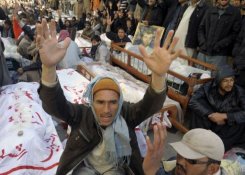(AFP) – Shi’a families refusing to bury their dead after twin bombings in Pakistan’s troubled southwestern city of Quetta vowed to continue their sit-in protest Saturday until the army takes over security.
Hundreds of protesters have gathered on the main road near the snooker hall that was the scene of Thursday’s twin suicide attacks, alongside more than 60 coffins carrying the victims’ shrouded bodies, senior administration official Hashim Ghilzai said.
The refusal to bury the bodies is an extreme position in Islamic society where the dead are normally buried the same or next day, but families say they will not leave until authorities agree to put the security and administration of the city under army control.
“The government machinery has failed, there is no protection for people in Quetta,” local Shi’a party official Hashim Mausawi said.
“We will not end our protest until we get an assurance that the Pakistan army will take over security and administrative control in Quetta.”
Sunni militant group Lashkar-e-Jhangvi claimed responsibility for the bombings, which took place in an area dominated by Shi’a Muslims from the Hazara ethnic minority and killed 92 people, with 121 wounded.
It was the worst ever sectarian attack on Shi’as, who account for around 20 percent of Pakistan’s 180 million population.
“We are trying to convince them to end the protest. We cannot offer them something which is not in our control,” Ghilzai told AFP after the bodies had remained on the road for about 30 hours, saying it was up to the government to decide whether to call in troops.
In a separate protest, more than 500 workers and supporters of the Shi’a Hazara Democratic Party gathered outside the office of the provincial police chief in the city as its leader Abdul Khaliq went on a three-day hunger strike against lack of security.
“We want an immediate takeover of Quetta by the army,” Khaliq said.
“The protest sit-in by hundreds of our supporters will continue for three days after which we will decide our future course of action.”
The government in Baluchistan province, where security forces are also fighting a separatist insurgency, announced three days of morning after the bombings.
It was the deadliest attack in Pakistan since suicide bombers killed 98 people outside a police training centre in the northwest in 2011 – an assault claimed by the Pakistani Taliban.
Earlier Thursday, a bomb had been detonated under a security force vehicle in a crowded part of Quetta, killing 11 people and wounding dozens.
Another bomb at a religious gathering in the northwestern Swat valley killed 22 people and wounded more than 80, the deadliest incident in the district since the army in 2009 fought off a two-year Taliban insurgency.
In total 126 people were killed in bombings in what was one of Pakistan’s deadliest days for years, raising concerns about rising violence in the nuclear-armed country ahead of general elections.
The United States condemned the “senseless and inhumane attacks,” with State Department spokeswoman Victoria Nuland saying Friday: “We remain concerned about extremist violence of any kind in Pakistan and remain committed to working with the government of Pakistan to combat terror.”
The attacks, coupled with violence in the northwest, revived warnings from analysts that Islamist militancy could threaten national elections, expected some time in May.
Polls would mark the first time an elected civilian government in Pakistan, for decades ruled by the military, completes a term in office and is replaced by another democratically elected government.
The Human Rights Commission of Pakistan demanded that the government take immediate steps to clamp down on “murdering mayhem” ahead of the elections.


